Unit 1 My Day 单元复习(四)-语法+典型例题(共88张PPT)
文档属性
| 名称 | Unit 1 My Day 单元复习(四)-语法+典型例题(共88张PPT) |

|
|
| 格式 | pptx | ||
| 文件大小 | 33.1MB | ||
| 资源类型 | 试卷 | ||
| 版本资源 | 人教版(PEP) | ||
| 科目 | 英语 | ||
| 更新时间 | 2025-03-11 00:00:00 | ||
图片预览

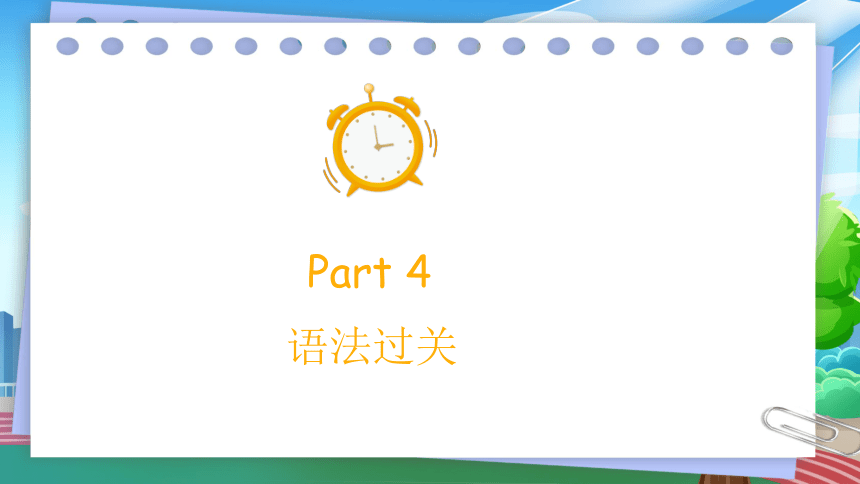

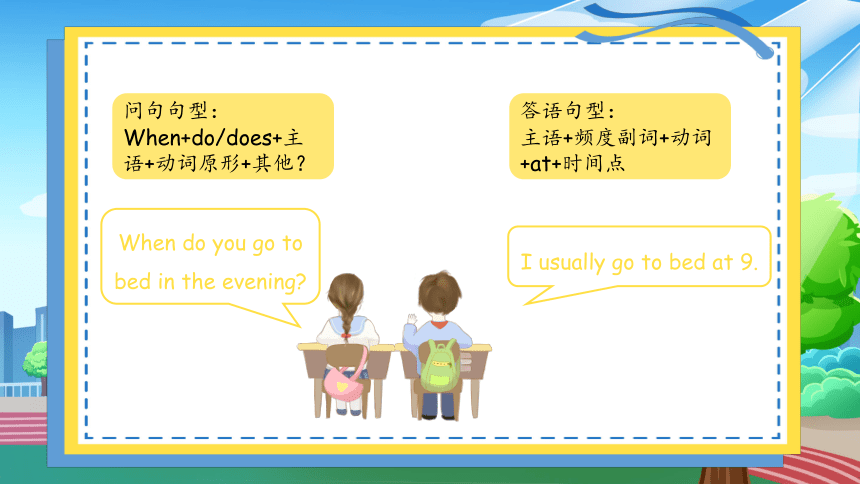
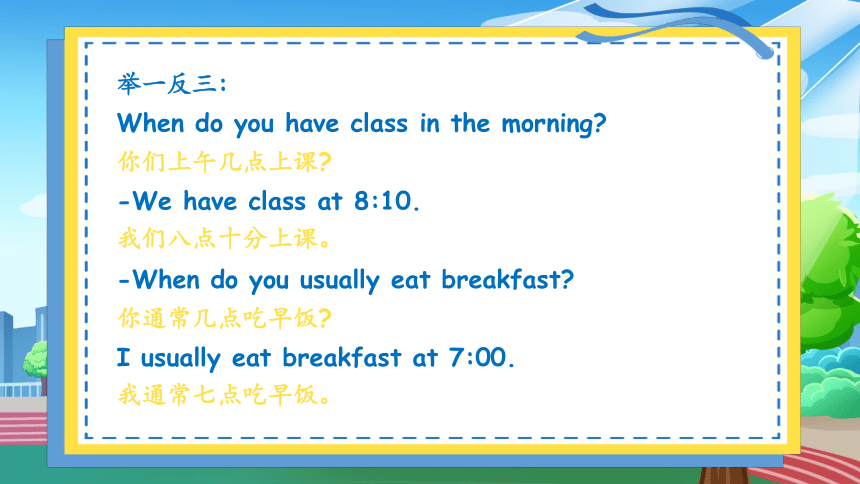
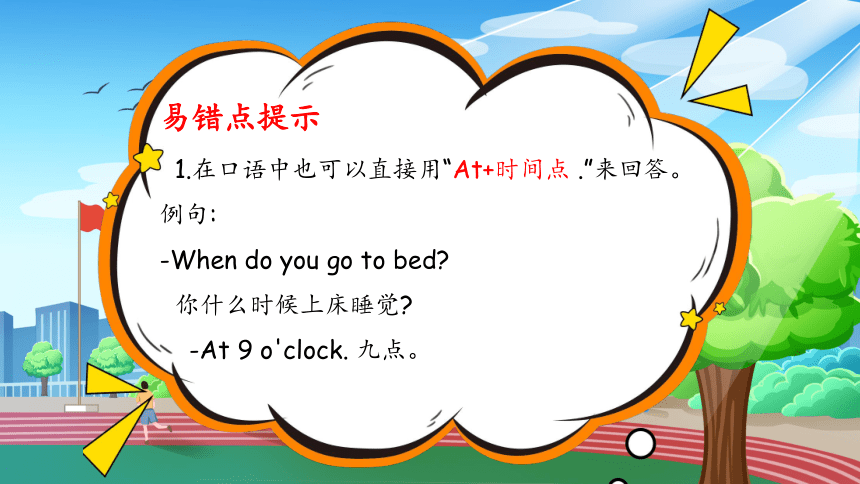
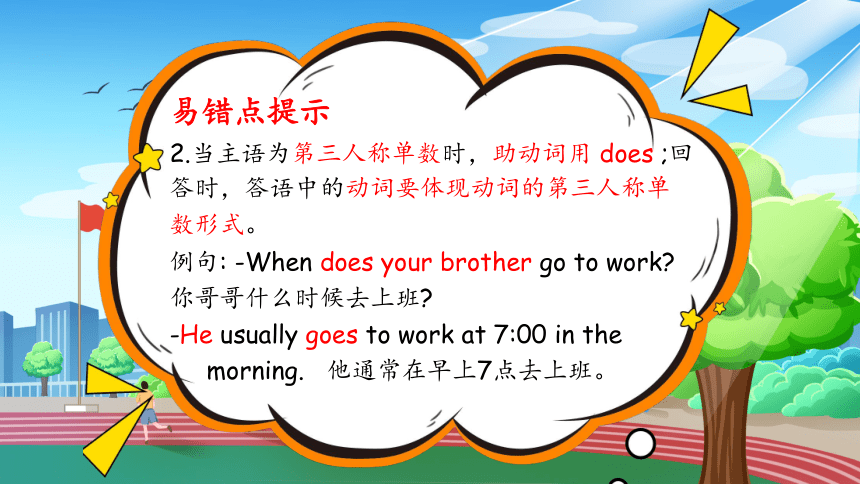
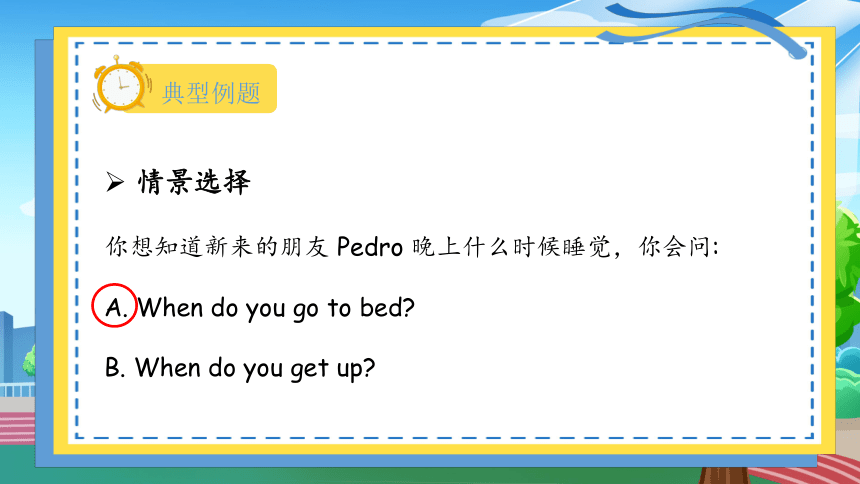
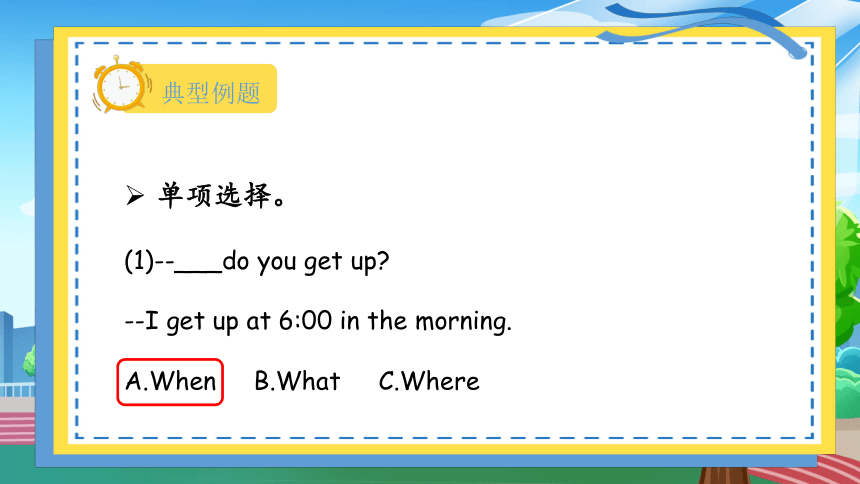
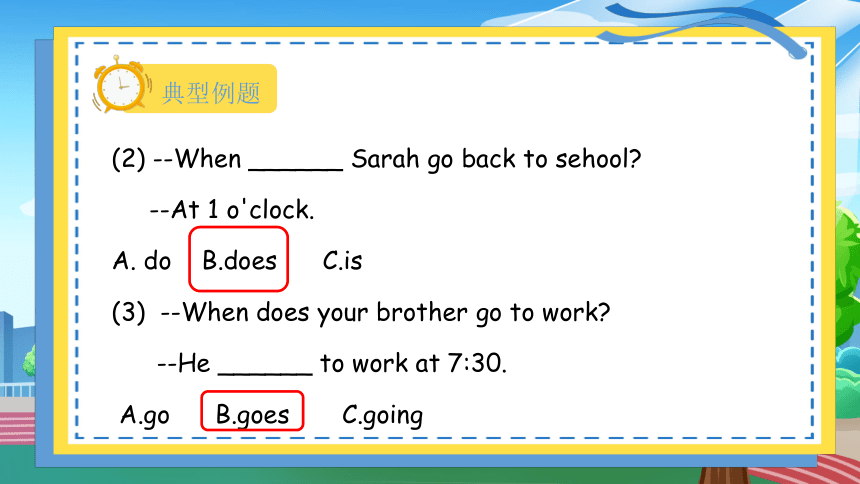
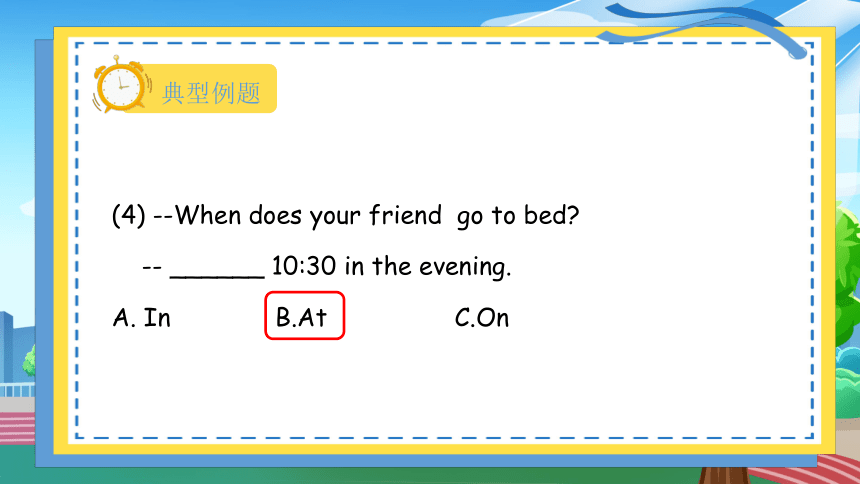
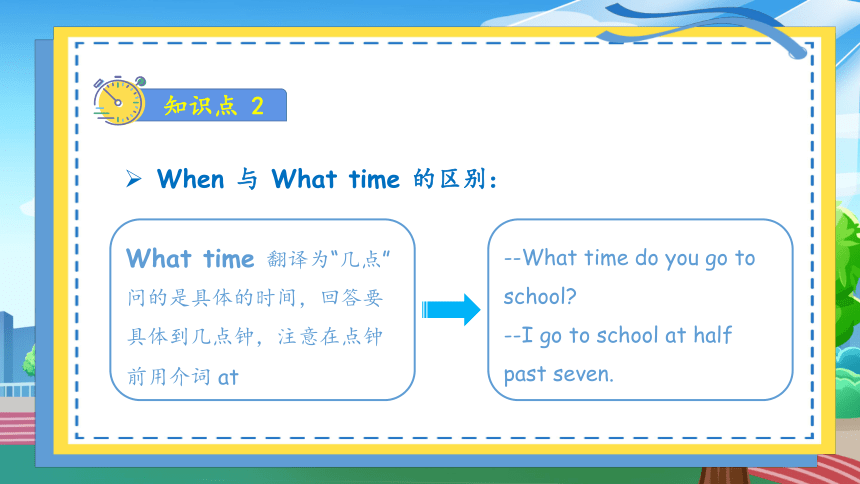
文档简介
(共88张PPT)
人教五下复习课件
主讲教师:
Part 4
语法过关
知识点 1
When do you finish class in the morning
We finish class at 1 o'clock.
When do you...
询问对方做某事的时间或从事某一活动的时间。
When do you go to bed in the evening
I usually go to bed at 9.
问句句型:
When+do/does+主语+动词原形+其他?
答语句型:
主语+频度副词+动词+at+时间点
举一反三:
When do you have class in the morning
你们上午几点上课
-We have class at 8:10.
我们八点十分上课。
-When do you usually eat breakfast
你通常几点吃早饭
I usually eat breakfast at 7:00.
我通常七点吃早饭。
易错点提示
1.在口语中也可以直接用“At+时间点 .”来回答。
例句:
-When do you go to bed
你什么时候上床睡觉
-At 9 o'clock. 九点。
易错点提示
2.当主语为第三人称单数时,助动词用 does ;回
答时,答语中的动词要体现动词的第三人称单数形式。
例句: -When does your brother go to work
你哥哥什么时候去上班
-He usually goes to work at 7:00 in the
morning. 他通常在早上7点去上班。
典型例题
情景选择
你想知道新来的朋友 Pedro 晚上什么时候睡觉,你会问:
A. When do you go to bed
B. When do you get up
典型例题
单项选择。
(1)--___do you get up
--I get up at 6:00 in the morning.
A.When B.What C.Where
典型例题
(2) --When ______ Sarah go back to sehool
--At 1 o'clock.
A. do B.does C.is
(3) --When does your brother go to work
--He ______ to work at 7:30.
A.go B.goes C.going
典型例题
(4) --When does your friend go to bed
-- ______ 10:30 in the evening.
A. In B.At C.On
知识点 2
When 与 What time 的区别:
--What time do you go to school
--I go to school at half past seven.
What time 翻译为“几点”问的是具体的时间,回答要具体到几点钟,注意在点钟前用介词 at
知识点 2
When 与 What time 的区别:
-When does he take a shower
-He takes a shower in the morning.at 6 o'clock in the morning.
when 翻译为“何时”,回答既可以是具体的时间,也可以是不具体的时间,如:in the morning, last year,in 1998 等范围大的时间。
典型例题
选择合适的疑问词填空
A. What time B. When
(1) -- ______is her birthday
--On February lst.
(2) --______is it
--It's five o' clock.
B
A
典型例题
情景选择
Pedro 的父母将会来中国看望他。Pedro 想知道他们哪一天会来,他会问:
A. What time will you come to China
B. When will you come to China
知识点 3
finish 的用法:
finish+名词/动词的-ing形式
完成某事/完成做某事
例句:When do you finish playing sports in the morning
典型例题
单项选择。
(1)--When do you finish______ every day
--At 8:30.
A.read B.write C.reading
(2) My friend Robin makes me finish______every day.
A. my homework B. do my homework
知识点 4
at 的用法:
at 意为“在”,用于准确的时间“几点几分”之前
例句:I usualy go to bed at 9:30.
我通常九点半上床睡觉。
用法 意义 例子
on on+星期名称 on+具体日期 on+具体某天上午/下午 on +具体某一天 on Monday
on May 1st
on Saturday afternoon
at at+具体时刻 at+具体某一时刻 at 8 o’clock
at noon
in in+月份/年份/ 上午/下午/晚上 in+大时间 in spring
in the morning
时间介词的用法盘点
典型例题
选择正确的介词填空。(其中一个介词可选两次)
in at on
(1)I play sports ______Saturday.
( 2) I go shopping _________ the afternoon.
(3)I go fishing _________Sunday afternoon.
(4) We usually have dinner______ 7 o'clock
on
in
on
at
知识点 5
go back to的用法:
go back to+地点名词(短语)表示“返回某地”
短语 go back to school 返回学校
go back to China 返回中国
例句:We usually go back to school in September.
我们通常九月份返回学校。
易错点提示
back 后接地点副词时通常不加 to。
例如: go back home 回到家
go back here 回到这儿
go back there 回到那儿
典型例题
单项选择
(1) --When do you go back______Beijing
--On Tuesday.
A. to B.at
(2) --When do you go back ______ here to pick me up, Dad
--At 5 o'clock.
A. to B./
知识点 6
时间表达法小结:
顺读法
整点:钟点数+o’clock
非整点:钟点数+分钟数
nine o’clock
ten ten
逆读法
30分钟以内:分钟数+past+钟点数
30分钟:half past +钟点数
超过30分钟:(60-分钟数)+to+(钟点数+1)
15分钟:a quarter past +钟点数
45分钟:a quarter to +(钟点数+1)
1
2
3
4
5
6
7
8
9
10
11
12
five past
ten past
a quarter past
twenty past
twenty-five past
half-past
twenty-five to
twenty to
a quarter to
ten to
five to
o’clock
TO PAST
TO PAST
1
2
3
4
5
6
7
8
9
10
11
12
It’s one o’clock
TO PAST
1
2
3
4
5
6
7
8
9
10
11
12
It’s five past nine.
TO PAST
1
2
3
4
5
6
7
8
9
10
11
12
It’s a quarter past seven.
TO PAST
1
2
3
4
5
6
7
8
9
10
11
12
It’s half past three.
TO PAST
1
2
3
4
5
6
7
8
9
10
11
12
It’s twenty five to eight.
TO PAST
1
2
3
4
5
6
7
8
9
10
11
12
It’s a quarter to five.
Try again!
Try again!
Well done!
It’s three o’clock.
It’s five o’clock.
It’s nine o’clock.
next
Try again!
Try again!
Well done!
It’s ten past ten.
It’s ten past two.
It’s ten to two.
next
Try again!
Try again!
Well done!
It’s half past nine.
It’s half past eight.
It’s half to nine.
next
Try again!
Try again!
Well done!
It’s twenty past eleven.
It’s twenty past ten.
It’s twenty to eleven.
Try again!
Try again!
Well done!
It’s quarter to nine.
It’s quarter past nine.
It’s quarter to three.
Try again!
Try again!
Well done!
It’s five to nine.
It’s quarter to eleven.
It’s five past nine.
知识点 6
频度副词小结:
频度副词:表示动作发生的次数,频率的副词叫做频度副词。
例句:Usually at 9:30 or 10 o’clock.
频度副词
always 总是 100%
often 经常 60%
hardly ever= seldom 几乎不 10%
never 从不 0%
usually 通常 80%
高
低
sometimes 有时 30%
always
含义:一直,总是
频度图例:
例句:I always do my homework after dinner.
我总是在晚饭后做作业。
usually
含义:通常
频度图例:
例句:We usually go shopping on weekends.
我们通常周末去购物。
often
含义:经常
频度图例:
例句:They often play sports on the playground.
他们经常在操场上做运动。
Sometimes
含义:有时
频度图例:
例句:My sister sometimes does morning exercise
at home.
我姐姐有时在家里做早操。
hardly ever=seldom
含义: 几乎不
频度图例:
例句:I hardly ever play computer games on Monday.
我周一几乎不玩电脑游戏。
never
含义:从不
频度图例:
例句:I never go to school by taxi.
我从不坐出租车去学校。
易错点提示
频度副词在句子中一般位于实义动词前,be动词
或情态动词之后,usually和 sometimes 可以放在句首,
有强调的作用。
例句:-Usually I read books in the park on the weekend.
通常我周末在公园读书。
-Sometimes I go shopping.
有时候我去购物。
典型例题
根据表格内容填空。
What do you do on the weekend Tom Amy Sam
clean my room ○ □ △
play football △ ○
do my homework □
take a dancing class ◇ ○
○ often □ always △ sometimes ◇ never
典型例题
Tom: I often________________. Sometimes I_____________.I________take a dancing class.
Amy:I________clean my room and do my homework. I________ take a dancing class.
Sam:I often____________.__________I clean my room.
clean my room
play football
never
always
often
play football
Sometimes
典型例题
根据汉语提示填空。
(1)She_____________(一直,总是) sleeps after lunch.
(2)My brother___________( 通常) plays computer games on weekends.
(3)They_________(经常) visit museums(参观博物馆 ) every year.
(4)My mum_____________ (有时) likes to make up(化妆).
(5)The boy ________(从不)does housework at home.
always
usually
often
sometimes
never
知识点 7
or的用法:
or :conj. 连词,用于连接并列的单词、短语或句子,意为“或者”,表示不确切、模糊的陈述。
例句:You can have dinner at home or go to the restaurant.
你可以在家吃晚饭或者去饭店吃。
or的其他用法:
or
表示一种否定的条件,意为 “否则”
Hurry up,or we’ll be late.
快一点,否则我们要迟到了。
用于否定句中
代替 and
He is not clever or friendly.
他既不 聪明也不友好。
用在选择疑问句中连接被选择的对象,意为“或
Is he a doctor or a
teacher
他是一名医医生;还是一名教师
典型例题
选一选。
(1) She will come here at 4 _____5 o'clock.
A. and B.or
( 2) Is she a teacher_____a saleswoman(售货员)
A.or B.and
B
A
典型例题
选一选。
( 3 ) I love my father_____my mother.
A. or B.and
( 4) Give this book to me,_____I will not let you go!
A.or B.so
B
A
知识点 8
play的用法小结:
play 搭配球类或棋类时不用the,而搭配乐器时要用the
play
play+球类/棋类/游戏
play+the+乐器
play+with+人/物
play tennis
play games
play chess/cards
play football
play basketball
play volleyball
play the piano
play the violin
play the guitar
play with Mike
play with dogs
play with snow
play 用法:
play的用法
play+球类/棋类/牌类
play+the+乐器
play+with+人/物
play football
play chess
play basketball
play cards
play the piano
play the violin
play with snows
play with cats
play with Mikes
典型例题
选择填空。
A. the B./
1.Ioften play _____football with my friends on the weekend.
2.My sister can play____guitar.
3.Tom usually plays____chess with his grandpa after dinner.
B
A
B
典型例题
英汉互译。
(1)我周末经常和我的朋友们打乒乓球。
_____________________________________________
(2)我会弹琵琶。
________________________________
I often play ping-pong with my friends on the weekends.
I can play the pipa.
典型例题
英汉互译。
( 3 ) I will play the piano for my mum.
________________________________
(4) I like winter because I can play with snow.
________________________________
我喜欢冬天因为我喜欢玩雪。
我将要弹奏钢琴给我的妈妈听。
知识点 9
Why is/are ...doing ... 询问某人在做某事的原因
句型:Why+be+主语+动词ing+其他。
Why:为什么,引导的疑问句用来询问别人做某事的原因。
例句:Why are you crying 你为什么在哭?
Why are you shopping today
易错点提示
be+动词的-ing形式表示动作正在进行,
be 动词要随着主语的变化而变化:
当主语是第三人称单数时,be 动词用 is;
当主语是第二人称或其他复数人称时,
be 动词用 are。
典型例题
我会选。
(1) --Why____he running to school
--He will be late for school.
A. be B.is C.are
(2) --Why ____ you cooking today
--My mum isn't at home.
A.be B.is C. are
B
C
知识点 10
一般过去时:表示过去某个时间里发生的动作或所处的状态。动词要用一般过去式。
例句:I played basketball last night.
My mom worked last night.
情况分类 变化规律 例词
一般情况 词尾+ed work→ worked
play→played
以不发音e结尾 词尾+d live→lived
move→moved
以辅音字母+y结尾 把y改为i+ed study→studied
try→tried
辅元辅结构的重读闭音节 双写词尾辅音字母+ed stop→stopped
plan→planned
不规则动词 go→went make→made get→got buy→bought come→came fly→flew 典型例题
我会选。
吴彬彬想和张鹏说他上周末打篮球了这件事情时,他是这样说的:
A. I play basketball on the weekend.
B. I played basketball last weekend.
C. I am playing basketball with John now.
知识点 11
What do/does ...do... 询问某人在特定时间做什么?
--So what do you do on the weekend
--I often watch TV and play pingpong with my father.
What does she do on Sarturdays
She often washes clothes
问句句型:
What+do/does+主语+do+时间短语?
答语句型:
主语+频度副词+动词+其他
易错点提示
1.问句句型中,当主语为第三人称单数时,助动词
用 does。
2.答语句型,也可用于介绍某人在某个时间做什么。
当主语为第三人称单数时,动词也要用第三人
称单数形式。
典型例题
我会选。
(1)--What ____ you do on the weekend
--I play football with my brother.
A. do B. are
(2)--What ____ he do on the weekend
--He goes camping with his family.
A. do B. is C. does
A
C
典型例题
我会选。
(3)--What do they____on Saturdays
--They often play football.
A. do B.are C.does
(4)-What does Mike do on Sundays
-He usually___ pictures.
A.draw B.draws C.drawing
A
B
知识点 12
sound like 的用法:
“听起来像”后面可以跟名词或动名词
--That sounds like a lot of fun.
--Yes,I’m also hard-working.
We’ll have an English party.
我们将会举办一个英语派对。
That sounds like a lot of fun.
那听起来好像很有趣。
典型例题
我会选。
--We often go swimming in summer.
--________________.
A. I think so.
B.That sounds like a lot of fun.
B
知识点 13
a lot of 的用法:
a lot of指很多,既可与可数名词连用,也可与不可数名词连用。同义词组是 lots of。
而 many 与可数名词复数连用;
much 与不可数名词连用。
例 句:
There are a lot of animals in the zoo.
在动物园有很多动物。
There are not many animals in the zoo.
在动物园没有很多动物。
典型例题
我会替换画线的词。
A. many B.much
(1) She has a lot of money, so she is rich.
( 2) There are a lot of trees in the park.
B
A
“也”有说法:
也
also
too
either
用于句中,肯定句
用于句末,肯定句或疑问句
用于句末,否定句
知识点 14
典型例题
选一选。
(1) Surfing the internet is_____interesting, but it's a waste of time.
A.too B.also C.either
( 2) I like playing basketball. My friend Li Ming likes playing basketball,_____.
A.also B.either C.too
B
C
典型例题
选一选。
( 3) My brother doesn't like the apples.Me________·
A.also B.either C.too
C
知识点 15
--My mum worked last night.So I’m shopping today.
我妈妈昨天晚上工作了,所以今天我来购物。
--You’re so busy! You need a robot to help you!
你很忙啊!你需要一个机器人来帮你!
--Good girl! So What do you do on the weekend
好孩子,那么你周六做什么?
so 的用法:
在这段对话中,so出现了三次,而且三个意思都不同。
用法 例句
连词,表示因果关系 “因此,所以” My mum worked last night.So I’m shopping today
引出后面的问题或建议 “那么” Good girl! So What do you do on the weekend
副词,用来代替整句话或者某一情况,“这样,如此”,常与 think,hope,say,be afraid,much 等词连用 I think so. 我认为是这样。
I hope so. 我希望是这样。
典型例题
你能译出 so 在下列句子中的意思吗
(1) My mum works this morning So my dad takes me to school.
(2)-Pandas live in China.
-I think so.
(3) There is so much corn in the house.
(4) -I can clean the room and wash clothes.
-You are helpful. So what else can you do
所以
这样,如此
如此
那么
知识点 15
need的用法
need+名词 需要某物
I need a book.
need+doing 需要被做某事
These plants need watering.
need+动词原形 需要做某事
I need to buy a new bike.
典型例题
选一选。
(1)I need an_______in the rainy day.
A. book B.umbrella
(2) He is so hungry. He needs_______some food.
A. eat B. to eat
B
B
知识点 16
go,play,have,do的常见结构的小结:
动词 结构 用法 例词
go go+动词ing 进行娱乐或体育活动 go fishing
go climbing
play play+球类名词 打/踢...球 play basketball
play+the+乐器 弹奏...乐器 play the piano
知识点 16
动词 结构 用法 例词
do do+(the)+动词ing 常用来表示日常活动 do the dishes
do homework
have have+三餐 吃某顿饭 have lunch
have+食物/饮料 吃/喝 have some bread
have+学科类名词 上...课程 have maths class
人教五下复习课件
主讲教师:
Part 4
语法过关
知识点 1
When do you finish class in the morning
We finish class at 1 o'clock.
When do you...
询问对方做某事的时间或从事某一活动的时间。
When do you go to bed in the evening
I usually go to bed at 9.
问句句型:
When+do/does+主语+动词原形+其他?
答语句型:
主语+频度副词+动词+at+时间点
举一反三:
When do you have class in the morning
你们上午几点上课
-We have class at 8:10.
我们八点十分上课。
-When do you usually eat breakfast
你通常几点吃早饭
I usually eat breakfast at 7:00.
我通常七点吃早饭。
易错点提示
1.在口语中也可以直接用“At+时间点 .”来回答。
例句:
-When do you go to bed
你什么时候上床睡觉
-At 9 o'clock. 九点。
易错点提示
2.当主语为第三人称单数时,助动词用 does ;回
答时,答语中的动词要体现动词的第三人称单数形式。
例句: -When does your brother go to work
你哥哥什么时候去上班
-He usually goes to work at 7:00 in the
morning. 他通常在早上7点去上班。
典型例题
情景选择
你想知道新来的朋友 Pedro 晚上什么时候睡觉,你会问:
A. When do you go to bed
B. When do you get up
典型例题
单项选择。
(1)--___do you get up
--I get up at 6:00 in the morning.
A.When B.What C.Where
典型例题
(2) --When ______ Sarah go back to sehool
--At 1 o'clock.
A. do B.does C.is
(3) --When does your brother go to work
--He ______ to work at 7:30.
A.go B.goes C.going
典型例题
(4) --When does your friend go to bed
-- ______ 10:30 in the evening.
A. In B.At C.On
知识点 2
When 与 What time 的区别:
--What time do you go to school
--I go to school at half past seven.
What time 翻译为“几点”问的是具体的时间,回答要具体到几点钟,注意在点钟前用介词 at
知识点 2
When 与 What time 的区别:
-When does he take a shower
-He takes a shower in the morning.at 6 o'clock in the morning.
when 翻译为“何时”,回答既可以是具体的时间,也可以是不具体的时间,如:in the morning, last year,in 1998 等范围大的时间。
典型例题
选择合适的疑问词填空
A. What time B. When
(1) -- ______is her birthday
--On February lst.
(2) --______is it
--It's five o' clock.
B
A
典型例题
情景选择
Pedro 的父母将会来中国看望他。Pedro 想知道他们哪一天会来,他会问:
A. What time will you come to China
B. When will you come to China
知识点 3
finish 的用法:
finish+名词/动词的-ing形式
完成某事/完成做某事
例句:When do you finish playing sports in the morning
典型例题
单项选择。
(1)--When do you finish______ every day
--At 8:30.
A.read B.write C.reading
(2) My friend Robin makes me finish______every day.
A. my homework B. do my homework
知识点 4
at 的用法:
at 意为“在”,用于准确的时间“几点几分”之前
例句:I usualy go to bed at 9:30.
我通常九点半上床睡觉。
用法 意义 例子
on on+星期名称 on+具体日期 on+具体某天上午/下午 on +具体某一天 on Monday
on May 1st
on Saturday afternoon
at at+具体时刻 at+具体某一时刻 at 8 o’clock
at noon
in in+月份/年份/ 上午/下午/晚上 in+大时间 in spring
in the morning
时间介词的用法盘点
典型例题
选择正确的介词填空。(其中一个介词可选两次)
in at on
(1)I play sports ______Saturday.
( 2) I go shopping _________ the afternoon.
(3)I go fishing _________Sunday afternoon.
(4) We usually have dinner______ 7 o'clock
on
in
on
at
知识点 5
go back to的用法:
go back to+地点名词(短语)表示“返回某地”
短语 go back to school 返回学校
go back to China 返回中国
例句:We usually go back to school in September.
我们通常九月份返回学校。
易错点提示
back 后接地点副词时通常不加 to。
例如: go back home 回到家
go back here 回到这儿
go back there 回到那儿
典型例题
单项选择
(1) --When do you go back______Beijing
--On Tuesday.
A. to B.at
(2) --When do you go back ______ here to pick me up, Dad
--At 5 o'clock.
A. to B./
知识点 6
时间表达法小结:
顺读法
整点:钟点数+o’clock
非整点:钟点数+分钟数
nine o’clock
ten ten
逆读法
30分钟以内:分钟数+past+钟点数
30分钟:half past +钟点数
超过30分钟:(60-分钟数)+to+(钟点数+1)
15分钟:a quarter past +钟点数
45分钟:a quarter to +(钟点数+1)
1
2
3
4
5
6
7
8
9
10
11
12
five past
ten past
a quarter past
twenty past
twenty-five past
half-past
twenty-five to
twenty to
a quarter to
ten to
five to
o’clock
TO PAST
TO PAST
1
2
3
4
5
6
7
8
9
10
11
12
It’s one o’clock
TO PAST
1
2
3
4
5
6
7
8
9
10
11
12
It’s five past nine.
TO PAST
1
2
3
4
5
6
7
8
9
10
11
12
It’s a quarter past seven.
TO PAST
1
2
3
4
5
6
7
8
9
10
11
12
It’s half past three.
TO PAST
1
2
3
4
5
6
7
8
9
10
11
12
It’s twenty five to eight.
TO PAST
1
2
3
4
5
6
7
8
9
10
11
12
It’s a quarter to five.
Try again!
Try again!
Well done!
It’s three o’clock.
It’s five o’clock.
It’s nine o’clock.
next
Try again!
Try again!
Well done!
It’s ten past ten.
It’s ten past two.
It’s ten to two.
next
Try again!
Try again!
Well done!
It’s half past nine.
It’s half past eight.
It’s half to nine.
next
Try again!
Try again!
Well done!
It’s twenty past eleven.
It’s twenty past ten.
It’s twenty to eleven.
Try again!
Try again!
Well done!
It’s quarter to nine.
It’s quarter past nine.
It’s quarter to three.
Try again!
Try again!
Well done!
It’s five to nine.
It’s quarter to eleven.
It’s five past nine.
知识点 6
频度副词小结:
频度副词:表示动作发生的次数,频率的副词叫做频度副词。
例句:Usually at 9:30 or 10 o’clock.
频度副词
always 总是 100%
often 经常 60%
hardly ever= seldom 几乎不 10%
never 从不 0%
usually 通常 80%
高
低
sometimes 有时 30%
always
含义:一直,总是
频度图例:
例句:I always do my homework after dinner.
我总是在晚饭后做作业。
usually
含义:通常
频度图例:
例句:We usually go shopping on weekends.
我们通常周末去购物。
often
含义:经常
频度图例:
例句:They often play sports on the playground.
他们经常在操场上做运动。
Sometimes
含义:有时
频度图例:
例句:My sister sometimes does morning exercise
at home.
我姐姐有时在家里做早操。
hardly ever=seldom
含义: 几乎不
频度图例:
例句:I hardly ever play computer games on Monday.
我周一几乎不玩电脑游戏。
never
含义:从不
频度图例:
例句:I never go to school by taxi.
我从不坐出租车去学校。
易错点提示
频度副词在句子中一般位于实义动词前,be动词
或情态动词之后,usually和 sometimes 可以放在句首,
有强调的作用。
例句:-Usually I read books in the park on the weekend.
通常我周末在公园读书。
-Sometimes I go shopping.
有时候我去购物。
典型例题
根据表格内容填空。
What do you do on the weekend Tom Amy Sam
clean my room ○ □ △
play football △ ○
do my homework □
take a dancing class ◇ ○
○ often □ always △ sometimes ◇ never
典型例题
Tom: I often________________. Sometimes I_____________.I________take a dancing class.
Amy:I________clean my room and do my homework. I________ take a dancing class.
Sam:I often____________.__________I clean my room.
clean my room
play football
never
always
often
play football
Sometimes
典型例题
根据汉语提示填空。
(1)She_____________(一直,总是) sleeps after lunch.
(2)My brother___________( 通常) plays computer games on weekends.
(3)They_________(经常) visit museums(参观博物馆 ) every year.
(4)My mum_____________ (有时) likes to make up(化妆).
(5)The boy ________(从不)does housework at home.
always
usually
often
sometimes
never
知识点 7
or的用法:
or :conj. 连词,用于连接并列的单词、短语或句子,意为“或者”,表示不确切、模糊的陈述。
例句:You can have dinner at home or go to the restaurant.
你可以在家吃晚饭或者去饭店吃。
or的其他用法:
or
表示一种否定的条件,意为 “否则”
Hurry up,or we’ll be late.
快一点,否则我们要迟到了。
用于否定句中
代替 and
He is not clever or friendly.
他既不 聪明也不友好。
用在选择疑问句中连接被选择的对象,意为“或
Is he a doctor or a
teacher
他是一名医医生;还是一名教师
典型例题
选一选。
(1) She will come here at 4 _____5 o'clock.
A. and B.or
( 2) Is she a teacher_____a saleswoman(售货员)
A.or B.and
B
A
典型例题
选一选。
( 3 ) I love my father_____my mother.
A. or B.and
( 4) Give this book to me,_____I will not let you go!
A.or B.so
B
A
知识点 8
play的用法小结:
play 搭配球类或棋类时不用the,而搭配乐器时要用the
play
play+球类/棋类/游戏
play+the+乐器
play+with+人/物
play tennis
play games
play chess/cards
play football
play basketball
play volleyball
play the piano
play the violin
play the guitar
play with Mike
play with dogs
play with snow
play 用法:
play的用法
play+球类/棋类/牌类
play+the+乐器
play+with+人/物
play football
play chess
play basketball
play cards
play the piano
play the violin
play with snows
play with cats
play with Mikes
典型例题
选择填空。
A. the B./
1.Ioften play _____football with my friends on the weekend.
2.My sister can play____guitar.
3.Tom usually plays____chess with his grandpa after dinner.
B
A
B
典型例题
英汉互译。
(1)我周末经常和我的朋友们打乒乓球。
_____________________________________________
(2)我会弹琵琶。
________________________________
I often play ping-pong with my friends on the weekends.
I can play the pipa.
典型例题
英汉互译。
( 3 ) I will play the piano for my mum.
________________________________
(4) I like winter because I can play with snow.
________________________________
我喜欢冬天因为我喜欢玩雪。
我将要弹奏钢琴给我的妈妈听。
知识点 9
Why is/are ...doing ... 询问某人在做某事的原因
句型:Why+be+主语+动词ing+其他。
Why:为什么,引导的疑问句用来询问别人做某事的原因。
例句:Why are you crying 你为什么在哭?
Why are you shopping today
易错点提示
be+动词的-ing形式表示动作正在进行,
be 动词要随着主语的变化而变化:
当主语是第三人称单数时,be 动词用 is;
当主语是第二人称或其他复数人称时,
be 动词用 are。
典型例题
我会选。
(1) --Why____he running to school
--He will be late for school.
A. be B.is C.are
(2) --Why ____ you cooking today
--My mum isn't at home.
A.be B.is C. are
B
C
知识点 10
一般过去时:表示过去某个时间里发生的动作或所处的状态。动词要用一般过去式。
例句:I played basketball last night.
My mom worked last night.
情况分类 变化规律 例词
一般情况 词尾+ed work→ worked
play→played
以不发音e结尾 词尾+d live→lived
move→moved
以辅音字母+y结尾 把y改为i+ed study→studied
try→tried
辅元辅结构的重读闭音节 双写词尾辅音字母+ed stop→stopped
plan→planned
不规则动词 go→went make→made get→got buy→bought come→came fly→flew 典型例题
我会选。
吴彬彬想和张鹏说他上周末打篮球了这件事情时,他是这样说的:
A. I play basketball on the weekend.
B. I played basketball last weekend.
C. I am playing basketball with John now.
知识点 11
What do/does ...do... 询问某人在特定时间做什么?
--So what do you do on the weekend
--I often watch TV and play pingpong with my father.
What does she do on Sarturdays
She often washes clothes
问句句型:
What+do/does+主语+do+时间短语?
答语句型:
主语+频度副词+动词+其他
易错点提示
1.问句句型中,当主语为第三人称单数时,助动词
用 does。
2.答语句型,也可用于介绍某人在某个时间做什么。
当主语为第三人称单数时,动词也要用第三人
称单数形式。
典型例题
我会选。
(1)--What ____ you do on the weekend
--I play football with my brother.
A. do B. are
(2)--What ____ he do on the weekend
--He goes camping with his family.
A. do B. is C. does
A
C
典型例题
我会选。
(3)--What do they____on Saturdays
--They often play football.
A. do B.are C.does
(4)-What does Mike do on Sundays
-He usually___ pictures.
A.draw B.draws C.drawing
A
B
知识点 12
sound like 的用法:
“听起来像”后面可以跟名词或动名词
--That sounds like a lot of fun.
--Yes,I’m also hard-working.
We’ll have an English party.
我们将会举办一个英语派对。
That sounds like a lot of fun.
那听起来好像很有趣。
典型例题
我会选。
--We often go swimming in summer.
--________________.
A. I think so.
B.That sounds like a lot of fun.
B
知识点 13
a lot of 的用法:
a lot of指很多,既可与可数名词连用,也可与不可数名词连用。同义词组是 lots of。
而 many 与可数名词复数连用;
much 与不可数名词连用。
例 句:
There are a lot of animals in the zoo.
在动物园有很多动物。
There are not many animals in the zoo.
在动物园没有很多动物。
典型例题
我会替换画线的词。
A. many B.much
(1) She has a lot of money, so she is rich.
( 2) There are a lot of trees in the park.
B
A
“也”有说法:
也
also
too
either
用于句中,肯定句
用于句末,肯定句或疑问句
用于句末,否定句
知识点 14
典型例题
选一选。
(1) Surfing the internet is_____interesting, but it's a waste of time.
A.too B.also C.either
( 2) I like playing basketball. My friend Li Ming likes playing basketball,_____.
A.also B.either C.too
B
C
典型例题
选一选。
( 3) My brother doesn't like the apples.Me________·
A.also B.either C.too
C
知识点 15
--My mum worked last night.So I’m shopping today.
我妈妈昨天晚上工作了,所以今天我来购物。
--You’re so busy! You need a robot to help you!
你很忙啊!你需要一个机器人来帮你!
--Good girl! So What do you do on the weekend
好孩子,那么你周六做什么?
so 的用法:
在这段对话中,so出现了三次,而且三个意思都不同。
用法 例句
连词,表示因果关系 “因此,所以” My mum worked last night.So I’m shopping today
引出后面的问题或建议 “那么” Good girl! So What do you do on the weekend
副词,用来代替整句话或者某一情况,“这样,如此”,常与 think,hope,say,be afraid,much 等词连用 I think so. 我认为是这样。
I hope so. 我希望是这样。
典型例题
你能译出 so 在下列句子中的意思吗
(1) My mum works this morning So my dad takes me to school.
(2)-Pandas live in China.
-I think so.
(3) There is so much corn in the house.
(4) -I can clean the room and wash clothes.
-You are helpful. So what else can you do
所以
这样,如此
如此
那么
知识点 15
need的用法
need+名词 需要某物
I need a book.
need+doing 需要被做某事
These plants need watering.
need+动词原形 需要做某事
I need to buy a new bike.
典型例题
选一选。
(1)I need an_______in the rainy day.
A. book B.umbrella
(2) He is so hungry. He needs_______some food.
A. eat B. to eat
B
B
知识点 16
go,play,have,do的常见结构的小结:
动词 结构 用法 例词
go go+动词ing 进行娱乐或体育活动 go fishing
go climbing
play play+球类名词 打/踢...球 play basketball
play+the+乐器 弹奏...乐器 play the piano
知识点 16
动词 结构 用法 例词
do do+(the)+动词ing 常用来表示日常活动 do the dishes
do homework
have have+三餐 吃某顿饭 have lunch
have+食物/饮料 吃/喝 have some bread
have+学科类名词 上...课程 have maths class
